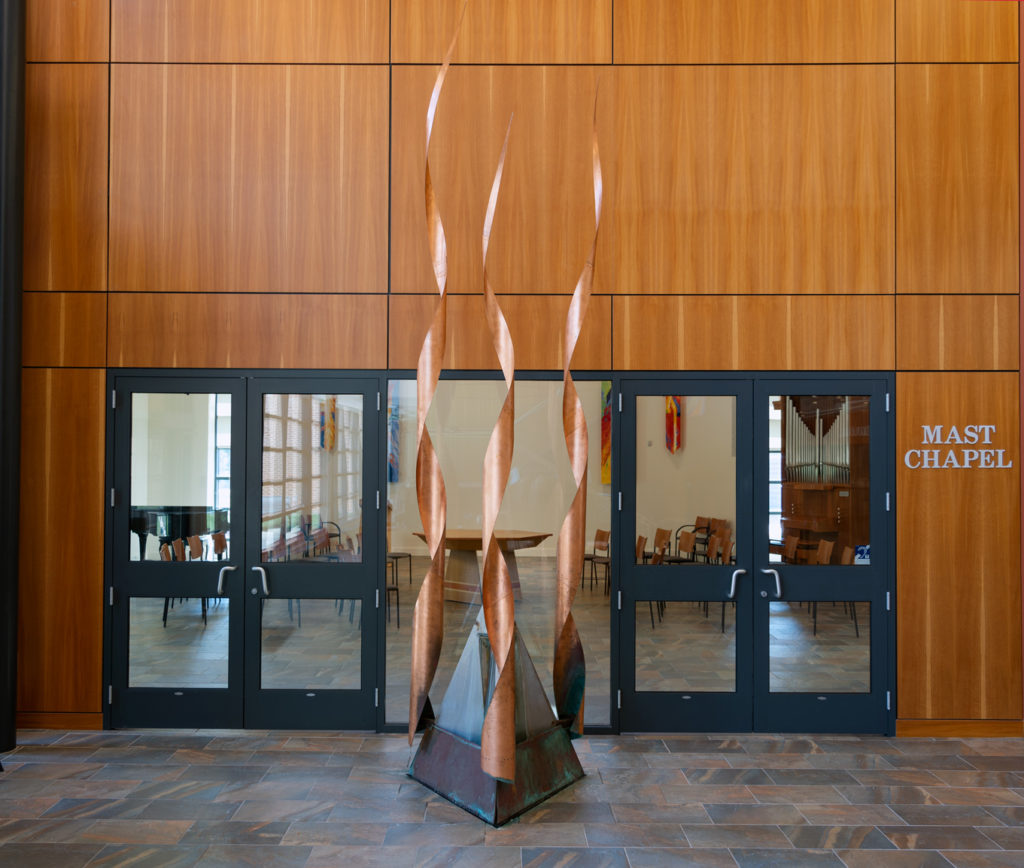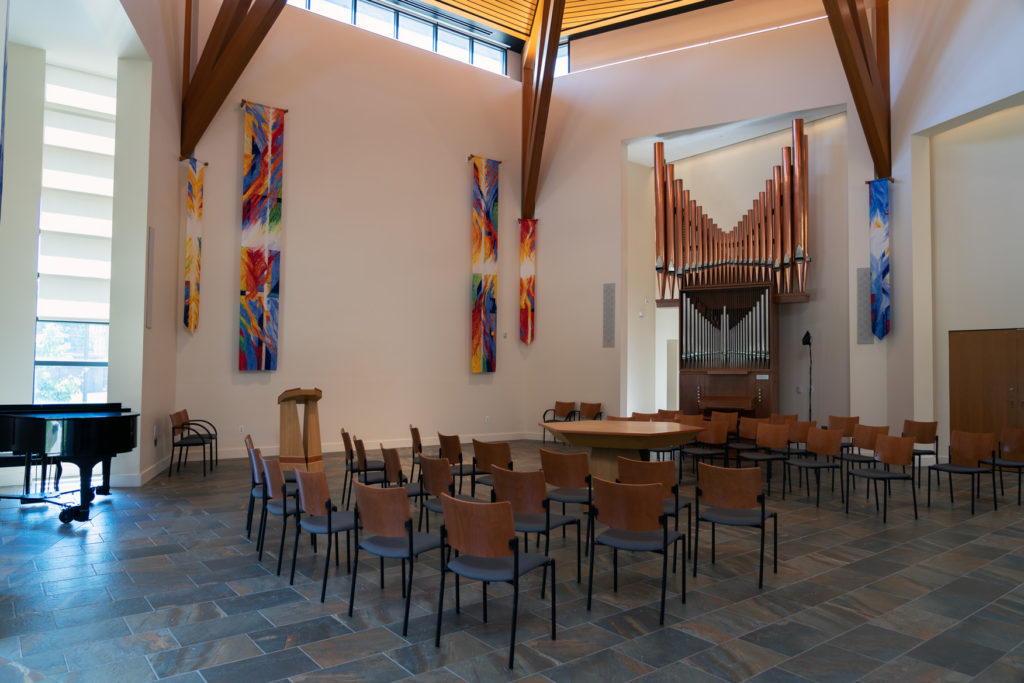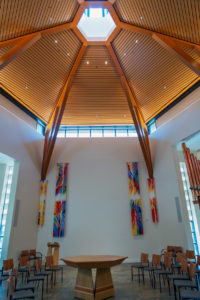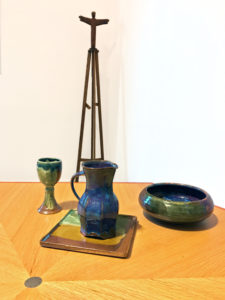Chapel/Worship Events
Worship is a vital dimension of theological education at New Brunswick Theological Seminary, and the primary expression of worship in our learning community is embodied in the life of our chapel.
Chapel Services on the NJ Campus
 During the school year, Chapel services are provided synchronously and asynchronously, two times per week from 6:00 pm to 6:25 pm. The days for chapel are announced at the beginning of each semester. The chapel schedule will also have several opportunities for in-person worship per semester. Students in hybrid classes are invited to enter the chapel for prayer and meditation any time they are on campus. For an updated chapel schedule, please see the Mast Chapel site in our Learning Management System, or email the Director of Mast Chapel, Suzanne Wenonah Duchesne at sduchesne@nbts.edu.
During the school year, Chapel services are provided synchronously and asynchronously, two times per week from 6:00 pm to 6:25 pm. The days for chapel are announced at the beginning of each semester. The chapel schedule will also have several opportunities for in-person worship per semester. Students in hybrid classes are invited to enter the chapel for prayer and meditation any time they are on campus. For an updated chapel schedule, please see the Mast Chapel site in our Learning Management System, or email the Director of Mast Chapel, Suzanne Wenonah Duchesne at sduchesne@nbts.edu.
NBTS emphasizes student and faculty leadership of chapel, and students plan and lead worship once a week. This is done in collaboration with the Director of Mast Chapel and in cooperation with the Dean of Students and various student organizations. If you are a student who desires to lead chapel, please email the Director of Mast Chapel, Suzanne Wenonah Duchesne at sduchesne@nbts.edu.
Mast Chapel
 Built in 2014 and named in honor and memory of Reformed liturgical scholar and former NBTS president, Gregg A. Mast, Mast Chapel is the focal point of our New Jersey campus, and it provides our seminary community with a beautiful and flexible worship space. Architect Michael Farewell led the design effort for Mast Chapel and described it as the “emotional heart” of the new campus.
Built in 2014 and named in honor and memory of Reformed liturgical scholar and former NBTS president, Gregg A. Mast, Mast Chapel is the focal point of our New Jersey campus, and it provides our seminary community with a beautiful and flexible worship space. Architect Michael Farewell led the design effort for Mast Chapel and described it as the “emotional heart” of the new campus.
While the interior of Mast Chapel is intimate (it seats 150 people), its hexagonal shape and strategically placed windows and skylights create transparency with the landscape and courtyard beyond. Its geometric elements and understated simplicity reflect Protestant architectural influences. By design, the Chapel is not overly opulent in order to keep focus on the Word and worship.
The Chapel Organ was designed and constructed by the Walcker Company of Germany in consultation with David Drinkwater, then Organist to Rutgers University and Choirmaster of the Kirkpatrick Chapel. This tracker pipe organ is a mechanical two manual, self-contained unit with eleven ranks of pipes, nine stops and three couplers. Its procurement was made possible by a generous gift from the Alumni Association of the Seminary. The Chapel Organ was installed in Zwemer Hall and dedicated in 1968, and in 2013 a significant restoration project was initiated by the seminary working with Patrick J. Murphy & Associates. The organ was relocated to Mast Chapel in 2014, where it is utilized in chapel services and institutional ceremonies.
Chapel Leadership
 Suzanne Wenonah Duchesne, Ph.D., Visiting Assistant Professor of Worship and Preaching, serves as Director of Mast Chapel and chair of the Worship Committee. As Director of Mast Chapel, Duchesne is responsible for the planning and implementation of all chapel activities in coordination with the Worship Committee; for providing leadership/planning for faculty worship; and for planning and implementation of all public worship events for the Seminary.
Suzanne Wenonah Duchesne, Ph.D., Visiting Assistant Professor of Worship and Preaching, serves as Director of Mast Chapel and chair of the Worship Committee. As Director of Mast Chapel, Duchesne is responsible for the planning and implementation of all chapel activities in coordination with the Worship Committee; for providing leadership/planning for faculty worship; and for planning and implementation of all public worship events for the Seminary.
Faye Taylor, Director of Field Education and the St. John’s Site, is also a member of the Worship Committee. She serves as an AME itinerant elder and pastor, and she is a crucial leader in our chapel life. She brings a number of gifts to our worship including, but not limited to, awareness of the spiritual needs of our campus in NYC, deep and fervent spirituality, and a concern for the well-being of our students.
Worship Vision
In May 2018, our Faculty Council affirmed the following statement about Christian worship and the place of chapel in theological education at New Brunswick Theological Seminary as we began an ongoing process of revitalizing our chapel worship. This statement provides a fixed—but fluid in the sense that we expect to revise it—point against which we measure our community’s worship life. It reads:
“What is worship? Christian worship is a constellation of communal practices through which a divinely-initiated encounter between God and humanity occurs. In this encounter, God actively reveals God’s self, extends redemptive grace, and, within the constraints of finitude, empowers the people of God to actively embody personal and social holiness and to rehearse and reorient themselves to the future reign of God.
What is the relationship between worship and theology? Christian worship is the source out of which Christian theology emerges. Theology subsequently informs and guides worship. Together, worship and theology ground each other and exist as a symbiosis of the practical and the theoretical.
What is the role of worship in theological education? Christian worship is the impetus for Christian theological education. Theological education functions to form individuals and communities to inform and guide worship. Together, worship and theological education ground each other and exist as a symbiosis of the practical and the theoretical.
What is the difference between chapel worship and worship? The NBTS chapel is not a formal church. Chapel worship has the unique potential to be a laboratory equipped for practice, research, observation, exploration, and experimentation of worship in a controlled environment focused on learning.
What is the role of chapel worship in theological education? (We have found it useful to identify polarities between which we can locate ourselves.) Pole 1: [chapel as a church] Chapel worship is the energizing source of theological education. Theological education then functions to form individuals and communities to go back into worship in the chapel and in the church with deeper knowledge and reflective insight. Together, chapel and church worship and theology ground each other and exist as a symbiosis of the practical and the theoretical. Pole 2: [chapel as a laboratory] Chapel worship is a site of theological education. Theological education, including practice, spiritual formation, research, observation, exploration, and experimentation, occurs in chapel worship. Chapel and classroom function together to educate students regarding practice and theory.
NBTS’s Faculty Council affirms that chapel worship at NBTS is a unique hybrid as both a worship laboratory equipped for practice, research, observation, exploration, and experimentation of worship in a controlled environment focused on learning and a site for communal expression of worship that can serve as an initial source for theological education. While we emphasize the former, it is our hope to simultaneously foster the latter. As such, chapel functions to assist in student learning while also grounding the theoretical aspects of theological education in rich spiritual practice.”
 Institutional Ceremonies and Services
Institutional Ceremonies and Services
During the school year, institutional worship services and ceremonies such as installations, matriculation, sabbatical lectures, baccalaureate, commencement, and other institutional events are digitally broadcast via the NBTS Facebook page. Please see upcoming events and join us.
Accessibility, Ecumenism, and Emancipatory Language
The Chapel at NBTS is committed to an accessible, ecumenical and emancipatory liturgical agenda, and we require that all worship be planned and implemented in a manner that welcomes and affirms the value, human dignity, and imago dei of all who attend, particularly those who experience social marginalization due to race, gender, class, ability, or sexuality.
NBTS Chapel Worship Services
For upcoming services, please visit us on Social Media (Facebook, Twitter, Instagram), or email the Director of Mast Chapel, Suzanne Wenonah Duchesne at sduchesne@nbts.edu.
